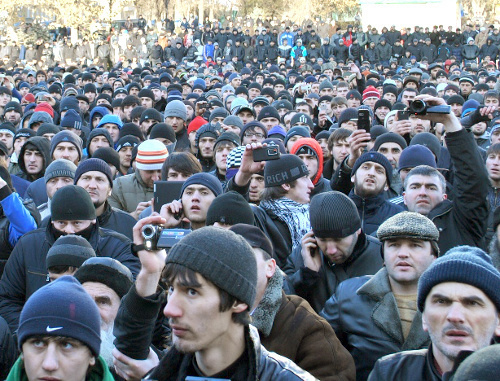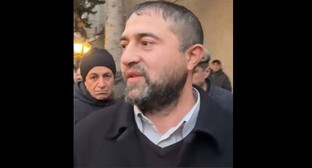
09 December 2011, 22:50
Dagestan: 12 percent of pupils and students support militants, public opinion poll shows
The radical methods used by militants are supported by 12 percent of pupils and students of Dagestan, regarding them as the key to solving the existing local problems. These are the results of the social opinion poll conducted in November by the monitoring group for the youth environment of the Republic of Dagestan. Experts believe that many people in Dagestan view the "Forest Jamaats" as the only alternative to the ruling corrupt power and treat the specialized religious education as a barrier to radicalization.
Opinion poll: 20 percent of respondents identify themselves as moderate Salafites
The polling was conducted in Makhachkala, Kaspiisk, Khasavyurt, Derbent, Izberbash and Kizilyurt and covered about 6000 respondents, namely, 1-3-year students of ten universities and colleges, 8-10-form pupils of eight secondary schools, and trainees of 16 sports institutions.
The group of respondents included Sunni Muslims, which make almost 95 percent of the population of Dagestan.
All the respondents said that they consider themselves as believing Muslims.
20 percent of respondents think that they are moderate Salafis, standing for the developed citizenship of their country and republic, but with Shariah norms, according to the model of state organization and management of the modern Sultanates of Brunei, Qatar, Bahrain and Oman. This position is clearly expressed in the most educated part of the youth, who believe that in Russia this model can be implemented in particular subjects, if the state is more open with regard to Muslims.
At the same time, this category of respondents is opposing the regimes of Saudi Arabia, United Arab Emirates, Egypt, Syria, Pakistan, etc.
12 percent of the respondents were in favour of the radical methods pursued by the "forest community". They are oriented towards radicalism in its most extreme manifestation of it. Representatives of this part of the youth are convinced that radical methods are the key to solving all the problems existing today in Dagestan.
10 percent of the respondents are adherents of Sufism and Tariqa beliefs. They believe that Tariqa is the "only good for all Muslims".
18 percent consider themselves Muslims but do not adhere to any of branches of Islam.
Gereev: for some Dagestani youth radicalism is a sort of social doctrine
It was explained to the "Caucasian Knot" correspondent by Ruslan Gereev, the head of the monitoring group of the youth environment of Dagestan and an expert of the Centre of Islamic Studies of Northern Caucasus, that the polling was conducted only in cities of the republic.
"It's probable that should the public opinion poll have been conducted in rural areas, the number of pupils and students, who support radical methods, would have been higher. For some of the Dagestani youth the ideology of radicalism has all the features of social doctrine. Today it has become a sort of a weapon or a sword in the fight against corruption and arbitrariness of the officials and power agents in Northern Caucasus," said the expert.
According to his story, "all the talks about investments, which continue from year to year, remain just empty talks, and ultimately boil down to the next 'splitting of budget funds'."
"People in the republic die under unclear circumstances, and disappear without a trace. The past protests (on November 21 and 25, Makhachkala hosted rallies, organized by the public organizations "Union of the Just"," Dagestan is Territory of Peace and Accord" and" Akhlyu Sunnah", with participation of relatives of kidnapped people and villagers of Shamkhal, where on November 19 several persons were detained. They held posters reading: "They were tortured just for their trust in Allah Great and Praised", "Muslims are tired of special services' lawlessness!", "Release our sons!" and "Who's ordered this lawlessness?" - note of the "Caucasian Knot") are a confirmation," said Ruslan Gereev.
According to his story, the gap between rich and poor people has reached such a scale that the poor have lost all hope for better life and have only one "resort" left - religion.
Besides, as noted by Gereev, basic rights of Muslims, guaranteed by Russian laws, are ignored in Dagestan.
All of these factors, in the opinion of Mr Gereev, have driven part of the Dagestani youth out of control.
"Besides, we observe rejuvenation of radically-minded people. According to law enforcement bodies, if two years ago the age of the members of the armed underground was 25-40 years, today the average age is 18-30. Independent experts cite even more terrible figures: 14-45. In fact, there is an undeclared war on for the minds of the younger generation," the head of the monitoring group of the youth environment of the Republic of Dagestan said.
He has drawn attention to the alarming situation, when school children professing different branches of Islam may not communicate with each other.
Mukhametov: systematically educated Muslim leaders, as a rule, adhere to moderate fundamentalism
Most of the respondents, who took part in the polling, are still supporting some forms of moderate fundamentalism, as the most appropriate form of Muslims' response to modern challenges, said Candidate of Political Sciences Rinat Mukhametov, a member of the advisory council at the Council of Muftis of Russia.
"I've never shared the idea of direct relationship of radicalism with the level of education. There is, of course, some relationship; however, there is also a mass of reservations, especially in the Caucasus, where people have a heightened sense of justice, personal dignity, honour and fear of being subjected to shame. Therefore, in the harshest and most brutal modern conditions, even people with higher education and radicalized, as well as former ministers, scientists, figures of culture and world-famous athletes," said Mukhametov.
"A specialized religious education is a certain barrier to radicalization; provided it is deep, systematic and well-assimilated. No wonder that preachers with superficial, sometimes fragmentary knowledge are popular in the 'forests'," concluded the expert.
Author: Asya Kapaeva Source: CK correspondent




